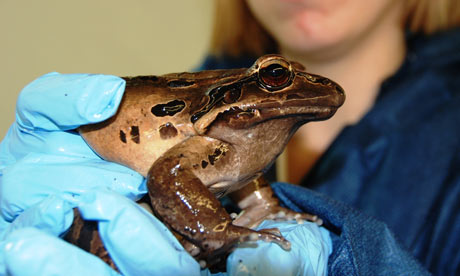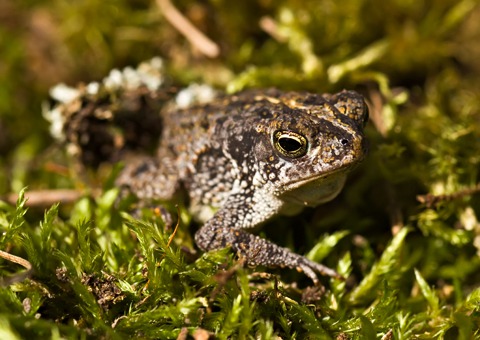Conservationists have rescued a number of critically endangered "mountain chicken" frogs from the path of a fatal disease which has hit their Caribbean island home of Montserrat.
The decision to remove 50 mountain chicken frogs (Leptodactylus fallax) from their natural habitat was taken in the face of the spread of the chytrid fungus, which is devastating amphibian populations worldwide.
The Zoological Society London (ZSL) and the Durrell Wildlife Conservation Trust, based in Jersey, have each provided a home for 12 of the frogs which have been removed from Montserrat. Another 26 have gone to Parken zoo in Stockholm.
The plan is to breed the rescued frogs in captivity in a bid to save the species from extinction.
Montserrat is one of only two sites where the once-common mountain chicken is found, but hundreds of the frogs - one of the world's largest species - have been killed in the last few weeks by the disease.
The mountain chicken - named because its flesh is said to taste like chicken - is threatened by hunting for food and loss of habitat, and most recently by outbreaks of the chytrid fungus.
Chytrid fungus is a disease which infects the skin through which many amphibians drink and breathe. In recent decades it has spread rapidly, and some scientists believe the situation is worsening as temperatures rise due to of climate change.
The other stronghold of the species, Dominica, saw populations crash from around 2002 onwards as a result of the disease, which is thought to have spread to Montserrat late last year or earlier this year.
Andrew Cunningham, a senior ZSL scientist, said: "Chytridiomycosis has already decimated the mountain chickens on Dominica and within a few weeks of the disease being diagnosed on the neighbouring island of Montserrat, its impact has been catastrophic. The mountain chicken frog has been virtually wiped out on the island and the number of surviving frogs decreases every day."
Director of conservation at the Durrell Wildlife Conservation Trust, John Fa, said the drastic action to remove the frogs was taken "simply because we know from other experiences that chytrid will completely decimate populations of frogs".
Scientists working with the Montserrat government were able to reach the main healthy population, which they knew would be soon by hit by the spreading chytrid, and remove individuals before it was too late, he said.
The Durrell trust has housed its rescued mountain chickens in a bio-secure unit at its wildlife park in Jersey and hopes to breed from the frogs to create a population which can be reintroduced in as little as two years.
ZSL London zoo will now house mountain chicken frogs from both Dominica and Montserrat in its captive breeding unit which includes temperature controlled rooms, automated spray systems and dedicated areas for rearing live food.
Bio-security measures including full paper suits, masks and gloves worn by keepers, ensure that no pathogens - such as the chytridiomycosis - can enter from the outside.
The mountain chicken is difficult to keep and breed in captivity because of its voracious appetite and its unusual breeding behaviour in which the frog creates a foam nest in the ground for the tadpoles which the female then feeds regularly with unfertilised eggs.
The plan is to reintroduce the frogs to a part of Montserrat which has not been affected by the chytrid fungus, while also maintaining a "safety net population" in captivity in case wild populations are hit by future outbreaks of chytrid.









